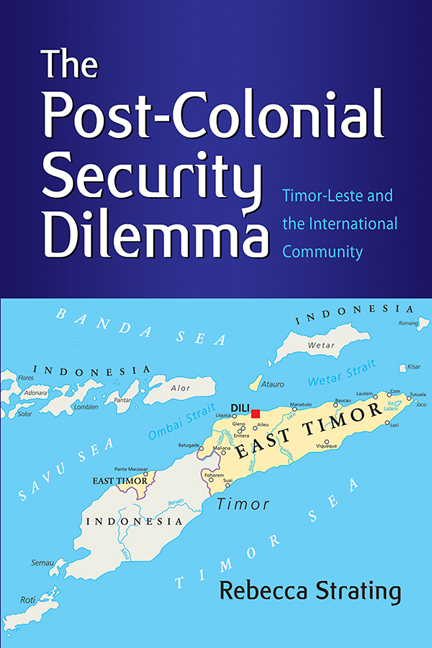Book contents
- Frontmatter
- Contents
- List of Tables
- Acknowledgements
- 1 Introduction
- 2 The Struggle for Recognition: Territorialization, Self-determination and the Imagining of “East Timor”
- 3 The Politics of Recognition: East Timor and the International Community
- 4 Establishing Legitimacy: International State-building in East Timor
- 5 Timor-Leste's Aspirational Foreign Policy
- 6 Identity Hedging: Timor-Leste's Engagement with Intergovernmental Organizations
- 7 Timor-Leste's National Security Agenda
- 8 Securing Economic Sovereignty
- 9 International Reconciliation and Transitional Justice
- 10 Conclusion: Timor-Leste in the Changing Regional Order
- Postscript
- Bibliography
- Index
- About the Author
9 - International Reconciliation and Transitional Justice
Published online by Cambridge University Press: 16 May 2019
- Frontmatter
- Contents
- List of Tables
- Acknowledgements
- 1 Introduction
- 2 The Struggle for Recognition: Territorialization, Self-determination and the Imagining of “East Timor”
- 3 The Politics of Recognition: East Timor and the International Community
- 4 Establishing Legitimacy: International State-building in East Timor
- 5 Timor-Leste's Aspirational Foreign Policy
- 6 Identity Hedging: Timor-Leste's Engagement with Intergovernmental Organizations
- 7 Timor-Leste's National Security Agenda
- 8 Securing Economic Sovereignty
- 9 International Reconciliation and Transitional Justice
- 10 Conclusion: Timor-Leste in the Changing Regional Order
- Postscript
- Bibliography
- Index
- About the Author
Summary
As previous chapters have argued, the two most significant bilateral relationships for guaranteeing Timor-Leste's sovereign independence are Australia and Indonesia. Timor-Leste's “post-colonial security dilemma” reflects its attempts as a new state to achieve and sustain “real” independence while grappling with its ongoing dependence upon other states in the international community. The emphasis on its bilateral relationship with Indonesia reflects dependence upon Indonesia's assistance in achieving socio-economic development and foreign affairs objectives, including gaining membership into ASEAN. It also highlights Timor-Leste's post-colonial insecurities arising from its limited military and defence capabilities and past experiences of resistance against Indonesian rule. As chapter seven outlined, the key military planning document, Forcas 2020, saw key external threats emerging from Indonesia in terms of boundary security and the perceived fragility of its democratization processes. Timor-Leste's foreign policy has recognized the need for a pragmatic realist orientation when it comes to its foreign policy towards Indonesia. Successive Timorese governments have privileged good relations with Indonesia ahead of international norms and values relating to transitional justice. This pragmatic realist approach sits in contrast with the “activist foreign policy” displayed in its negotiations with Australia over Timor Sea oil and gas detailed in the previous chapter.
Timor-Leste has sought to address security fears arising from its close proximity to Indonesia through a process of “international reconciliation”. Timor-Leste's national identity was largely formed through the independence movement, and was driven by an anticolonial nationalism, with Indonesia positioned as the “common enemy”. The movement from enemy to friend through the processes of political reconciliation required reorienting Indonesia's relationship with the East Timorese and vice versa following Timor-Leste's attainment of sovereignty. This entailed developing new relationships between Timorese and Indonesian political leaders, and recasting the relationship between the two states within Timor-Leste's foreign policy narrative. Timor-Leste has sought international reconciliation with Indonesia to benefit border security, trade relations and development projects across a range of sectors.
Timor-Leste's political reconciliation with Indonesia is most prevalent when examining issues of transitional justice. Since attaining sovereignty in 2002 Timor-Leste has been responsible for establishing legitimate democratic institutions that possess widespread public support and encourage socio-political order through respect for rule of law. Following the independence referendum, Timor-Leste faced a number of divergent challenges in implementing post-conflict, transitional justice mechanisms to promote democratization, rule of law and a human rights culture.
- Type
- Chapter
- Information
- The Post-Colonial Security DilemmaTimor-Leste and the International Community, pp. 272 - 302Publisher: ISEAS–Yusof Ishak InstitutePrint publication year: 2018

